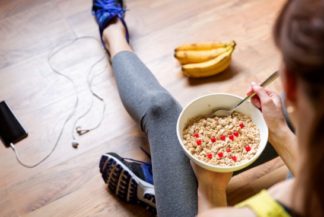A Healthy Diet Plan for Women, and for those who are Pregnant or have reached Menopause

An introduction to women’s nutrition
Getting a balanced diet is imperative to keeping your mind and body functioning to the best of its ability. The food you eat is what fuels you for the day and keeps your body moving – but how do we know if we’re eating the right foods for us? As well as the general rules to abide by like making sure you’re eating the right amounts of each of the five food groups, there are also nutrients that are particularly important for women’s nutrition. We’ll be guiding you through some general nutrition dos and don’ts as well as focusing on what nutritional needs women have at different stages of their lives.
The five food groups are fruit & veggies, carbs, dairy & dairy alternatives, proteins and fats. Fruit and vegetables should make up a weighty part of your diet and the best way to do this is to make sure that you eat five portions of fruits and veggies per day. You should try and vary what fruit and veg you’re eating so as to give your body a wide range of vitamins and minerals. Carbohydrates should make up a third of your diet as they give you slow releasing energy to keep you moving throughout the day – but you have to make sure they’re whole grain. Dairy and dairy alternatives are mostly important for their high levels of calcium to keep your bones and teeth healthy. Beans, pulses, eggs and fish are some of the best sources of protein so make sure you’ve got plenty of those in your diet too. And not forgetting the unsaturated fats such as oils and spreads (in smaller amounts) as they are high in energy.
If you’ve had a busy day or need an extra boost of energy, you might be in need of a healthy snack. Rather than turning to crisps or chocolate (which are the saturated fats we want to avoid) why not buy a TREK bar? TREK bars are free of any added sugar and other nasties and are made with 100% plant based ingredients making them the perfect guilt free snack. If you’ve got a hankering for a fruity treat, why not try our Blueberry & Pumpkin Seed bar? Or if you’re in need of a boost of energy, you could try our High Protein Peanut Butter Crunch bar.
But we’re all different and different bodies have different needs. So even though this is a good baseline to stick to, depending on where you are in your life, your body might need more of certain vitamins and minerals. Let’s take a look through some of the different nutritional needs women might have.
Daily iron requirement
As we know, people who menstruate lose blood for 5-7 days a month. Even though this amount varies from person to person, it can still result in fatigue due to loss of iron. This makes it super important to know how much iron you need and how to recognise the signs of iron deficiency.
You need 18 mg of iron a day on average and you can find iron in the following foods: lean meat, seafood, nuts, beans, leafy greens such as spinach and kale and fortified cereals. Iron is essential for growth, making certain hormones and for transporting oxygen to your tissues. Iron deficiency can lead to anemia which is when you don’t have enough healthy red blood cells to transport oxygen through your body so this really is an important mineral to keep an eye on!
Pregnancy diet
Pregnancy takes a huge toll on the body so making sure you’re well nourished is vital for your health and the health of the growing baby. Although the age old idea of ‘eating for two’ is strictly true, you do need more micronutrients and macronutrients to support you and the baby. Micronutrients are minerals and vitamins whereas macronutrients are nutrients that provide energy. This means more protein, fats (the good kind) and carbs – sounds like a good requirement to us!
A pregnancy diet isn’t that far from a regular balanced diet, there’s just a bit more of it. You should eat your normal recommended calories for the first trimester, then an additional 350 calories for the second trimester, increasing to 450 calories in the third and final trimester. As when you’re not pregnant, you should avoid processed foods and saturated fats as they provide no nutritional value for you or your baby.
The best types of foods to consume whilst pregnant are as follows:
- Protein helps the growth of your baby’s tissues and organs including the brain. It also helps the blood flow to your baby so this food group is vital for helping your baby grow big and strong! Good sources of protein are: lean pork and beef, chicken, salmon, nuts, beans and nut butters like peanut butter.
- Calcium is another important one as it helps you baby’s teeth and bones grow. Pregnant women need a whopping 1000mg of calcium a day so you might want to consider adding some calcium supplements to help you achieve this. Calcium rich foods include: milk, yogurt, cheese, dark leafy greens and calcium set tofu.
- Folate (also known as folic acid) aids the reduction of birth defects such as spina bifida and anencephaly. Folate is commonly found in the following foods: nuts, dried beans and lentils, eggs, leafy greens and nut butters.
- As we know, iron is an important mineral for women and that doesn’t stop during pregnancy! It helps ensure the flow of oxygen to you and your baby making it an essential part of your pregnancy diet. Foods containing iron include: dark and leafy greens (an all rounder, you might say!), citrus fruits, lean beef or poultry and eggs.
Menopause nutrition
In a similar way to your body’s needs change during pregnancy, they also change during and after the menopause. The menopause is the end of the menstrual cycle and even though that sounds like a cause for celebration, it can come with side effects. Thankfully, making sure you’re eating the right foods can lessen these side effects and have you feeling more like yourself again.
During the transition to and from menopause, the hormone estrogen declines which disrupts your usual cycle of estrogen and progesterone. A decline in estrogen can lead to a slowing down of your metabolism and can also affect how your body digests certain foods like carbs.
Foods that have been found to give some relief to menopause symptoms include the following:
- The decline in estrogen can increase the risk of bone fractures. Dairy products contain vitamins and minerals such as: calcium, phosphorus, potassium, magnesium and vitamins D and K all of which help bone health. Dairy products have also been shown to aid sleep – another menopause symptom.
- Whole grains are the kind of carbs we like as they provide energy as well as being high in nutrients and fibre. It turns out that they are also beneficial for post menopausal women as well! Whole grains are linked to improving heart health as well as lowering the risk of diabetes.
- Fruits and vegetables are the staple of our diet as they’re packed with vitamins, minerals, fibre and antioxidants. And some studies show that they can lessen menopause symptoms such as hot flashes and sleep disruption although more studies are needed to be totally accurate.
- Phytoestrogens act as weak estrogen in your body so they can act as a replacement for the estrogen your body has lost. Foods that contain phytoestrogens include: soybeans, peanuts, chickpeas, berries, plums and flax seeds. Some studies show that eating more phytoestrogens can lessen menopause symptoms however, more studies are required to be sure.
Whether you’re pregnant, menopausal or you haven’t reached either of these stages in your life yet, it’s vitally important to make sure your body is getting the right amount and type of nutrients. Make sure you’re avoiding processed foods and getting those leafy greens! And if you want more information on nutrition, make sure to keep an eye out for our men’s nutrition and general nutrition blogs.
Find our general nutrition guide here: https://eattrek.com/blog/making-nutrition-simple/
Find men’s nutrition guide here: https://eattrek.com/blog/an-easy-guide-to-mens-nutrition/





